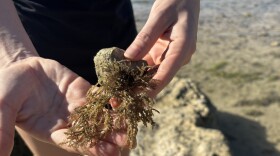Updated: Aug. 30, 6:59 a.m.
HONOLULU — Authorities on Thursday sedated and euthanized four small whales after 10 of the animals were stranded alive on Sugar Beach on Maui. One whale calf was also found dead about a mile north of the other melon-headed whales.
Veterinarians determined the four melon-headed whales were in grave condition and nothing more could be done to save them, Jeffrey Walters, the wildlife management and conservation branch chief for the National Oceanic and Atmospheric Administration, said in a statement.
The animals were made comfortable with a sedative and then humanely euthanized to relieve their suffering, he said.
The remaining six whales were refloated to the ocean. National Oceanic and Atmospheric Administration Regional Marine Mammal Response Coordinator David Schofield said the six came back ashore but eventually made it out to deeper water.
Walters said NOAA and University of Hawaii scientists will examine the whales to determine what caused the stranding on Sugar Beach in the town of Kihei.
Kealoha Pisciotta, a Native Hawaiian cultural practitioner, said the whales are a manifestation of the sea god Kanaloa.
She and others want to hold up the whales in the water so they could recover and swim away or die dignified deaths. But she said NOAA officials won't let them near the whales.

"All we're seeking to do is have a relationship with our Kanaloa," she said.
Walters said NOAA worked closely with Hawaiian cultural practitioners, who prayed before and after the whales were euthanized.
"We will continue to work with practitioners and other community members to the maximum extent possible, while we fulfill our mandate to conduct stranding response and post-mortem exams under the Marine Mammal Protection Act," Walters said.
Pisciotta said nine practitioners were at the scene and performed a death rite, in which they called to the ancestors and akua or gods, so the whales could be taken quickly. She said they only performed the rite because the animals were being killed. She said the practitioners never agreed to the euthanizing.
"We're not saying you cannot do a necropsy, we're just saying just give them a chance to die normally," she said.
The cause of this stranding is still being investigated.
Melon-headed whales are found in deep, tropical waters worldwide. They grow to be about 9 feet long.
There are an estimated 400 of the animals in the Hawaiian Islands. The last time this many marine mammals stranded together in Hawaii was two years ago, when five pilot whales died in Kauai's Nawiliwili Harbor.
Before that, about 150 melon-headed whales nearly stranded at Kauai's Hanalei Bay in 2004. One whale died.
NOAA's report on that incident said Navy sonar may have contributed to the near-stranding, but officials lacked evidence to conclusively show the technology triggered it.
The report, which was published in 2006, said nearby predators or other factors may have also contributed to the incident. The Navy was hosting its biennial Rim of the Pacific military exercises in Hawaii water at the time.




